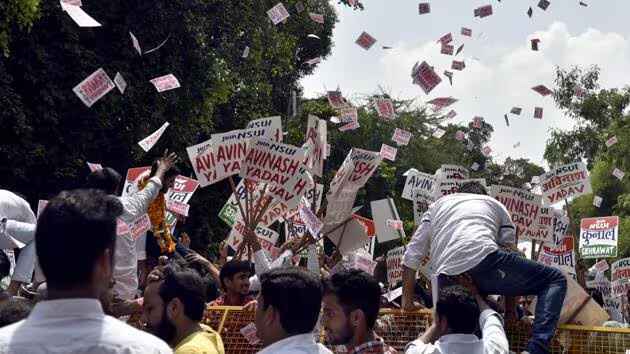TW// Sexual harassment & casteism
After a gap of three years, the Delhi University campuses have been covered in the hues of Student Union Elections. However, the true face of these elections may be found beneath the democratic facade. While money and power are the most addressed sides of this dark coin, there is another side that frequently gets overlooked: caste politics and gender-based violence.
The Delhi University Student Union (DUSU) Elections are being held after a gap of three years because of the Covid-19 pandemic. Pamphlets, roads covered with paper cut-outs, banners, posters, fights, and long traffic jams marked the beginning of the campaign of various student union organisations across campuses at DU. From the north campus to the south campus and off-campus colleges, every college at the University of Delhi is draped in the colours of elections. However, what lurks behind these hues is a mix of democracy and oppression.
Hundreds of posters, thousands of paper cut-outs all over the streets, and rallies of black and white cars tossing the same paper cut-outs you’re walking on speak volumes about how democratic and accessible the DUSU elections are. However, beyond these money and power dynamics lies the worst face of the DUSU elections: an open breeding ground for sexual harassment and casteism.
It is difficult to distinguish the inappropriate advantage taken of such packed surroundings at large-scale rallies with hundreds of party workers yelling slogans and the names of their candidates. Whether it’s a kind but unwelcome handshake or being unexpectedly touched in a throng or a bunch of guys gazing at every woman moving by, footage of mobs of men forcibly entering women’s colleges appears all over the internet every year. The fact that there are no proper caps on crowd control or codes of conduct gives these people the pass to repeat it again and again.
I have witnessed sexual harassment take place during election events. As soon as it gets crowded and people start getting pushed around, they start touching you everywhere. The language they use makes us feel disgusted. Right now, a person approached us and said: ‘Kya laundiya khadi kar rakhi hain’ (What women have they made stand here). We are also students, so what is wrong with us supporting any party just because we are women? The opposition, especially, really tries to make us feel uncomfortable as a part of their own political agenda.
– Two female party supporters in an interview to Newslaundry
Students find it difficult to speak out about sexual harassment on campus due to the rising degree of fear culture established by these mobs of men. This year, too, hordes of ABVP members forcibly entered Miranda House’s campus twice.
When any left-wing organisation stages a tiny protest, massive police forces are deployed. They are sometimes detained for “disturbing the peace on campus. However, in incidents like these, where ABVP men forcibly entered the campus of a women’s college twice, there will be no police deployment or action, even after complaints.
-A student from the women’s college of DU
Apart from toxic masculinity and a free pass for sexual harassment, caste-based violence is also common during elections. These elections are dominated by Jats and Gujjars. Every DUSU president from 2011 to 2017 was either Jat or Gujjar. These two communities dominate not just the president but the whole panel. Voting in the name of caste is also very common.
TW// Casteism
I heard my classmates say, ‘Ye AISA waale SC/ST ke chapri logo ki toli hai, isko kon vote dega’ (AISA is a group of people from the SC/ST community, who’s going to vote for them).
– A third-year BSc. student
Vote appeals based on caste are fairly prevalent. Even upper-caste voters say it would be a disgrace if a lower-caste person won the election. In 2018, the Delhi Police released an advisory urging students not to vote based on caste. They warned candidates who appealed for votes based on their caste.
The larger question is whether left-wing politics, which is more issue-centric and nuanced in its narrative, is putting pressure on bigger parties to reform themselves. The pinjra tod campaign that seeks to make hostel and paying guest accommodation regulations less regressive and restrictive for women students is refreshing to see. In the past year, we can see a change in the way the NSUI has conducted itself, and this could have been an influence of left-leaning groups like the All India Students’ Association (AISA).
-Apoorvanand, professor at the Department of Hindi, University of Delhi in an article by Firstpost (2018)
The present DUSU elections have their foundation on four pillars: money, muscle, masculinity, and caste. The lack of a strict code of conduct and the administration’s inability to maintain a check on hooliganism give these individuals a free pass to do such things again and again. Whether it’s blocking traffic for their campaign, forcibly entering women’s colleges, or instilling terror in caste and gender minorities.
A safe, free, and fair election is often demanded. While most students would want to remain bystanders to the drama of these elections, such a stage is unachievable. Unification is required to bring about a complete transformation in the electoral process. Until then, the DUSU elections will be viewed as a reflection of the greater electoral landscape rather than a democratic practice.
Featured Image Credits: The Hindu
Read Also: Power and Politics in the Delhi University Students’ Union
Dhruv Bhati





Comments are closed.